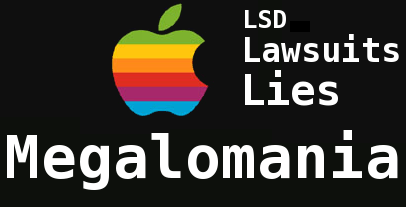10.16.12
Posted in Patents at 2:36 pm by Dr. Roy Schestowitz

Summary: Patent aggression no longer monopolised by trolls and corporations; UC Regent joins the club
A month ago a university decided to use patents aggressively, earning itself a lot of negative publicity, such as:
The UC Board of Regents and a University of California patent licensee have filed a lawsuit against Facebook, Disney and Wal-Mart claiming patent infringement.
There are other cases of patent harassment, but when public institutions participate in it the public should be outraged. Here is an example of crushing competition: “San Francisco real estate information site Trulia has been sued by larger competitor Zillow for patent infringement over a software program that helps make home valuations more accurate.”
Here is where public institutions provide a platform to patent lobbying:
Liveblogging the America Invents Act: One Year Later conference at the Indiana University Mauer School of Law. Warning and disclaimer: Quality may vary and these don’t necessary reflect my opinions.
It is troubling when universities become quite so political and also sue companies. US citizens ought to shun such universities. █
Permalink
 Send this to a friend
Send this to a friend
Posted in GNOME, GNU/Linux, Microsoft, Patents at 2:07 pm by Dr. Roy Schestowitz

Summary: More evidence of a malicious trend at patent trolls like Acacia (hiring Microsoft veterans), not to mention patent trolls that are entirely created by Microsoft veterans
The abusive monopolist from Redmond patents yet more nonsense as the fight against Linux and Android intensifies. Microsoft sues the Google-owned part of Motorola, as we noted the other day.
It is a Google lawsuit and some news sites point this out as they ought to:
Microsoft Corp said on Friday it plans to add Google Inc as a defendant in Germany in one of its patent actions against Google’s phone maker, Motorola Mobility, marking the first time the two tech giants have come into direct legal conflict over Google’s Android mobile software.
Microsoft contends that Google’s Android infringes its software patents but so far has pursued handset makers rather than Google itself for payment of royalties.
This is not the first such lawsuit against Google if one counts patent proxies. Let us also remember Nokia and MOSAID, not to mention Acacia which takes yet more Microsoft staff now: “Acacia Research Corporation, one of the most litigious and notorious patent trolls wasting valuable space on this planet, today announced that it has rounded out its management team with the appointment of Paul Bawel as Vice President.
“The move is notable, because Bawel has over 13 years of patent licensing experience, having previously worked as Sector IP Law Director at Motorola. Most recently, he was a Senior Attorney for Microsoft, where he was responsible for managing patent and IP issues for the Windows Phone division.”
Perfect position from which to sue Google?
Recall other notorious patent trolls and some of the latest from the world’s biggest patent troll, created with heavy Microsoft involvement. Here are some new details: “In an initial assessment of the patent, which was applied for in 2008, Michael Weinberg from the Public Knowledge digital rights organisation told Technology Review that Intellectual Ventures, led by former Microsoft CTO Nathan Myhrvold, is attempting to secure the ownership of a Digital Rights Management (DRM) system for 3D printing. The patent is “very broad” and also includes printing on “skin, textiles, edible substances, paper and silicon”, said Weinberg.”
This troll, along with Paul Allen’s, has already targeted Android. It is not just Microsoft suing Android; it uses proxies too.
Judge Posner [1, 2, 3, 4, 5] has just publishes an article titled “Patent Trolls Be Gone”. In it, Posner suggests a fix for this type of scenario and this new interview helps show others from the legal system who got fed up with it all:
Having formerly practiced as a patent attorney and advocated before the US Patent and Trademark Office with Darby and Darby, Cheryl Milone has become quite an expert on all things “patent”. She now sits affront of her 5 year old startup company: Article One Partners. Article One Partners is the world’s largest patent validation community. What makes Article One Partners so unique is that the company adds a crucial level of review to the US patent system – strengthening legitimate patents and reducing unjust patent monopolies (surely she doesn’t mean us Patent Trolls right?). Upon further discovery of Article One’s success, we we’re fortunate to have an opportunity to discuss Article One Partners, Patents, Patent Trolls, the Patent System with none other than the patent expert herself – Cheryl Milone.
We ought to note that this new site, patenttrolls.org, is worth subscribing to. The site has been supporting/endorsing our work. The goals overlap to a degree. █
Permalink
 Send this to a friend
Send this to a friend
Posted in Apple, GNU/Linux, Google, Microsoft, Patents at 1:43 pm by Dr. Roy Schestowitz
Apple takes away your phone

Summary: Apple’s Microsoft-esque behaviour adds thunder to the lightning of patent monopolies
THROWING away the whole patent system is not so queer a proposition anymore. We find more and more bloggers, authors and even academics who entertain the idea. This has led to discussion which leads to fruitful suggestions:
Jordan Weissmann, a bright guy over at The Atlantic, recently proposed The Case for Abolishing Patents (Yes, All of Them). He couldn’t be more right, I’d say, but I also know that the world I love in is not ready for that – just about every first-world country has quagmires of a similar depth.
The Apple vs. Samsung patent fight prompted another blogger to ponder “What if they patented the alphabet?” Yeah, Richard Stallman wakes up screaming over that kind of nightmare.
When even scholars call for radical change it is actually the patent-holding Linux founder who adopts a soft stance. “In case you missed it,” writes the leader of OStatic, “Slashdot recently hosted a question-and-answer online event with none other than Linux Torvalds. Readers were invited to send in questions, and Torvalds addressed a baker’s dozen of them. Among his more interesting and unexpected responses, it seems that he is not so against patents as some people might think.”
This actually is not entirely new or surprising. His stance does matter a lot because “Earlier this year, Torvalds recieved one of the technology commmunity’s highest honors: He was named a Millenium Technology Prize laureate by the Technology Academy of Finland.”
This is like a Nobel equivalent and now we learn about yet another Nobel laureate who opposes software patents. There are several more [1, 2, 3].
The New York Time has just covered it, very briefly after it too slammed the patent system. Apple has been the catalyst of much anger against patents and Steve Jobs' best friend has done his share of the damage, too.
Jobs was indeed of the opinion that Apple needs to lock competitors out with software patents, says the Microsoft booster at CNET. The Times helped show this:
Apple’s exploits in the world of software patents are under close scrutiny, and with good reason. Every few weeks new applications are unearthed providing possible clues to future products, or insights into what’s already been released.
In recent years though, the focus has been less about products and more about how Apple can use these patents in court — or to avoid it entirely. Case in point, just a handful of patents (seven to be precise) were enough to set the stage for a dramatic U.S. court battle between Apple and Samsung, a fight that already has is sequel lined up.
[...]
According to the former Apple executive, the Times says then Chief Executive Officer Steve Jobs completely changed the way the company handled patenting its products, going so far as to set up monthly “invention disclosure sessions” where engineers would meet with patent lawyers to make sure every change to any products was covered in a patent.
Apple has done nothing but hold back innovation in smartphones (by deterrence and/or lawsuits). In fact, real innovators walked away from Apple in disgust. To quote: “An eye-opening piece on the high tech patents maelstrom , published by the New York Times, reveals how a genius involved with Siri is walking away from voice recognition.”
The psychopaths and megalomaniacs pretend they invented everything, but they hardly invented, they marketed. Samsung is the company which actually invents and also manufactures.
Avoiding lawsuits [1, 2] from Apple is not simple because those lawsuits became a matter of strategy (worth Jobs’ “last breath,” to use his own words), just like at Vringo , which sues more and mocks the system [1, 2]. Google and Android are affected: “On September 6, 2012, the Modernist published an article in which he intimated that the “the only recent Supreme Court decision relating to software patent law” supports Google’s (GOOG) defense in its upcoming trial with Vringo (VRNG). This is an utterly tortured interpretation of the law. I write to debunk the Modernist’s legal interpretations and conclusions and present a more accurate and fulsome interpretation of potentially relevant Supreme Court precedent.”
Apple has a similar strategy, but Apple has its own products. The same goes for Microsoft, but Microsoft, unlike Apple, sends patent trolls to attack Android. More on that in a separate post… █

Permalink
 Send this to a friend
Send this to a friend
Posted in News Roundup at 6:05 am by Dr. Roy Schestowitz

Contents
-
-
Server
-
-
The JunosV App engine further enhances the MX routers with a Linux powered KVM virtual hypervisor.
-
SWIFT, the financial messaging provider, has announced that customers can now deploy Alliance Access, its messaging interface, on Red Hat Enterprise Linux.
-
Kernel Space
-
The first release candidate of the Linux 3.7 kernel was released on Sunday.
-
For too long, Linux and ARM chips haven’t lived in harmony. Sure, flavors of the open source operating system are demonstrably capable of running on ARM chips, but it’s required programmers to build and tweak their code on a case-by-case basis. Last year, Linus Torvalds famously described “this whole ARM thing” as “a f*cking pain in the ass.”
-
In the release notes to Version 3.5.6 of the Linux kernel, maintainer Greg Kroah-Hartman warned users that there would likely be only one more version of that branch of the kernel, and that users should get ready to move to the 3.6 branch as soon as possible.
-
-
-
You know a software-project is on fire when there are even a few hundred tweaks to the code. 10K commits for the release-candidate for Linux 3.7 is amazing. How Linus can herd that much change is beyond me. He handled hundreds per day… I feel really old…
-
-
-
Graphics Stack
-
-
NVIDIA released CUDA 5.0 on Monday morning and it boasts many new features for this popular GPGPU environment.
-
Applications
-
-
Instructionals/Technical
-
Games
-
-
We have been sharing some pretty good Ubuntu apps and tutorials with you lately. And in this post, we would sharing some cool open source Ubuntu games with you. There is a myth that Ubuntu is mostly used by geeks, but I contradict it as I know dozens of people who are not all geeks but love using Ubuntu.
In this post, we would sharing some free games for Ubuntu which adds more to our Ubuntu apps lists. I have tried to include the top games of top genres so that everybody finds something for themselves in this post.
-
Desktop Environments
-
K Desktop Environment/KDE SC/Qt
-
KDE Plasma Active, the desktop environment’s device-independent user-experience, is now up to its third release. KDE Plasma Active Three boosts the performance while also bringing new applications.
-
After several months of concerted team work, we have put the final wrapping on the next major release of Plasma Active. The last two weeks were spent testing on both ARM- and Intel-based devices to identify and fix show-stopper defects. It was time well spent, resulting in a polished release that shines as a successor to Plasma Active Two.
-
The KDE Foundation has released a new version of the KDE Plasma Active, a mobile implementation of KDE for wide range of devices.
-
-
GNOME Desktop
-
The Gnome foundation has released a video of a welcome tour of Gnome. This video will likely be integrated with the Gnome desktop and will startup when the user uses the desktop for the first time. This will help new users to get started with Gnome and use the desktop efficiently.
-
Another cool feature seems that will soon land in Gnome. This time Gnome makes “RAID Creation” easy, a work of Red Hatter David Zeuthen.
David (G+, blog) mostly hacks gnome-disk-utility and together with the UX team is responsible for the new options and design in Gnome Disks.
-
-
-
New Releases
-
-
-
-
After finally trying Mageia 2 I can clearly see why the download numbers appear to be skyrocketing. Though only recently introduced, Mageia already has much to offer its users, as you will soon see.
-
PCLinuxOS/Mageia/Mandrake/Mandriva Family
-
-
Anne Nicolas announced a few minutes ago, October 14th, the immediate availability for download of the second Alpha release of the upcoming Mageia 3 operating system.
-
-
In a post on the Mandriva Project’s Community Blog, Jean-Claude Vanier has announced that the foundation for the Mandriva Linux distribution will be called “OpenMandriva”. The new name of the foundation was chosen as it was both the winner of an online poll and the name selected by Mandriva SA, the French company entity behind Mandriva.
-
The foundation behind Madriva Linux has got a new name. OpenMandriva was chosen based on an online poll of users and by Mandriva SA, the software company behind Mandriva Linux. Though the foundation’s name has been fixed, the name of the distro is yet to be decided.
-
In a post on the Mandriva Project’s Community Blog, Jean-Claude Vanier has announced that the foundation for the Mandriva Linux distribution will be called “OpenMandriva”. The new name of the foundation was chosen as it was both the winner of an online poll and the name selected by Mandriva SA, the French company entity behind Mandriva.
-
Red Hat Family
-
Fedora
-
About Chrome the reasons are clear, Google’s Chrome is a proprietary software, it contains not open source modules, so end of story.
In the case of Chromium which is an OS project, things are getting more complicated and go way back in November 19, 2009, when a discussion started about shipping Chromium in Fedora. Almost three years later, we are still in starting point.
-
Debian Family
-
-
Derivatives
-
Canonical/Ubuntu
-
-
The Ubuntu Linux distribution, however, had long stood apart from many other major open source projects because it never sought public donations. To be sure, the Ubuntu community has benefited considerably from the philanthropic gestures of former Canonical CEO Mark Shuttleworth, who invested $10 million in the Ubuntu Foundation. But Ubuntu developers never solicited gifts from the public at large.
-
-
-
MooresCloud, a Australian electronics company have created a LED lamp that can run Linux and the LAMP server. The project is currently fundraising in Kickstarter and once complete, it will be priced at just $99 and use Linux as its core OS.
-
Eben Upton writes on the official blog, “One of the most common suggestions we’ve heard since launch is that we should produce a more expensive “Model C” version of Raspberry Pi with extra RAM. This would be useful for people who want to use the Pi as a general-purpose computer, with multiple large applications running concurrently, and would enable some interesting embedded use cases (particularly using Java) which are slightly too heavyweight to fit comfortably in 256MB.”
-
The Raspberry Pi Model B has had its RAM doubled to 512MB, but will stay at its original price
-
The Raspberry Pi Foundation has announced a new version of the popular ARM-based mini-computer board with twice the memory of previous versions. The revised board will replace the current Model B variant but will retain the $35 price tag and all other elements of the Raspberry Pi Model B design: two USB ports, HDMI port, SD card slot and Ethernet port.
-
-
The cost of a Raspberry Pi computer you can buy today is $25. It has a 700 MHz CPU with 256 MB RAM.
In 2001, the Power Mac G4 Cube, with 450 MHz CPU with 64 MB RAM, cost $1,799. That is how much hardware prices have fallen. Meanwhile, a LEGO X-Wing costs $59.99.
-
The Raspberry Pi mini computer just got a RAM upgrade – from 256MB to 512MB — but the $35 price-tag is staying the same. Eben Upton, chip design and founder of the Raspberry Pi Foundation, said the extra RAM follows frequent suggestions for a more expensive version of the Pi with more RAM for those who want to use the Pi for general computing purposes. But Upton notes the Foundation is “very attached to $35 as our highest price point” — in a recent interview with TC, Upton described price as “our differentiator”.
-
The OpenWRT development team has released an initial beta version of the forthcoming OpenWRT 12.09, named “Attitude Adjustment”. According to the announcement, it will no longer support Linux kernel 2.4. This affects older routers with only 16MB RAM or with slower CPUs (200MHz), such as some WRT54G models from Linksys, on which more recent kernel versions (brcm47xx) run poorly.
-
Phones
-
Finnish mobile startup Jolla, which is building a new OS based on the MeeGo platform with a strong focus on China, has named a new CEO as it moves towards its first product launch ahead of the unveiling of its Sailfish OS next month. Former CEO Jussi Hurmola will now focus on “Sailfish strategy” (and moves onto the Jolla Board), while Jolla’s former COO, Marc Dillon, will take over as CEO. Dillon’s background includes working in a variety of senior engineering roles at Nokia across Symbian, S40 and MeeGo.
-
Android
-
ZTE will be showing off it’s ‘Grand’ series of Android devices at this year’s ITU Telecom World 2012 and GITEX Technology Week in Dubai.
On display will be the ZTE Grand Era, Grand Era LTE, Grand X V970(M) and Grand X LTE (T82), as well as various other devices. The Grand Era LTE is due to launch in Europe in Q4 2012 and in the Middle East and North Africa in the first half of 2013, with plans for the Grand X V970(M) to be available in Saudi Arabia at the end of this year.
-
There’s a bumper crop of thumb drive-sized TV boxes/computers this year. One of the most popular has been the MK802, both because it was one of the first to market, and also because its Allwinner A10 processor makes running Linux almost as easy as running Android (which is the operating system it ships with.
-
Mobile phone vendors selling Android smartphones in China replace restricted Google services with local apps and content, to make sure user experience is not compromised.
-
Rich leads Google Ventures’ mobile investments and has over 25 years of experience growing businesses in the mobile industry. He is a co-founder of Android and helped lead the development of the Android platform and ecosystem at Google.
-
-
Sub-notebooks/Tablets
-
Demand for white-box tablets rolled out by China-based makers remains strong currently despite the launch of US$199 models by Amazon, Barnes & Noble and Google, and the dominance of Apple’s iPads, according to industry sources.
-
Twitter Engineering team has open-sourced Clutch.io, a library that will help developers to create iOS based apps faster and better. Developers can also deploy their apps instantly and run several A/B tests make sure their apps run well.
-
From the rise of foundations to emerging revenue models, the open source movement is primed for even greater impact on tomorrow’s technologies
-
Events
-
Next week is the OpenStack Summit and I couldn’t be more excited. This isn’t just a typical IT conference where vendors pitch their wares (though that will be there too). This is a working conference where the future of OpenStack will be mapped out.
This is also the first big board meeting since the official formation of the OpenStack Foundation last month. So yeah, lots on the table.
-
-
SaaS
-
Oracle/Java/LibreOffice
-
Funding
-
FSF/FSFE/GNU/SFLC
-
The Free Software Foundation has launched a fund raising campaign on behalf of GNU MediaGoblin, a free software media publishing system for images, video, and audio.
Coding on the MediaGoblin project, which aims to provide decentralized and extensible tools for media sharing that adhere to free software principles, has been ongoing since 2011 and currently is at version 0.3.1.
-
The Free Software Foundation (FSF) has awarded its “Respects Your Freedom” (RYF) hardware certification to the LulzBot AO-100 3D printer made by Aleph Objects. This makes the LulzBot AO-100 the first device to receive the certification since the RYF programme’s launch. The programme was originally created in 2010 to endorse devices that respect the customer’s freedom and use free software in all parts of the product.
-
The Free Software Foundation (FSF) and the GNU Project today announced the opening of nominations for the 15th annual Free Software Awards. The Free Software Awards include the Award for the Advancement of Free Software and the Award for Projects of Social Benefit.
-
It is in the nature of things that ideas which upset the status quo or challenge the prevailing orthodoxies are watered down to make them more acceptable, which is why the free software movement is an essential part of the landscape
-
Project Releases
-
Public Services/Government
-
Gunnar Hellekson, Technology Strategist for Red Hat’s U.S. Public Sector Group, presents a timeline created by tying together data about software the government has released as open source.
-
The Council of the Polish Region of Lower Silesia corrected its procurement specification following complaints from a civil IT procurement watchdog. In the updated request, published in September, the council no longer asks for a specific proprietary brand of operating system and ditto office suite. The watchdog hopes this opens the way for providers of open source alternatives to participate in the bid.
-
Openness/Sharing
-
Linux has changed the way we compute using software tools available through the open source. It opened up a new world of software development for those opposing the proprietary technology solutions.
How about a Linux for seeds? This is what a small set of scientists, including in ICAR (Indian Council of Agricultural Research), independent scientists and non-governmental organisations, are thinking loudly.
-
Standards/Consortia
-
In case you haven’t thought about it lately, it’s a fair bet that everything in your life today depends to some greater or lesser extent (usually the former) on the Internet and the Web. And in case you’ve never thought about it at all, what makes those vital services possible has less to do with servers and fiber optics than it does with protocols and other standards. Take that reality a step further, and it becomes obvious that that the processes by which these essential enablers of our interconnected world are created is pretty important.
Permalink
 Send this to a friend
Send this to a friend





















 Content is available under CC-BY-SA
Content is available under CC-BY-SA